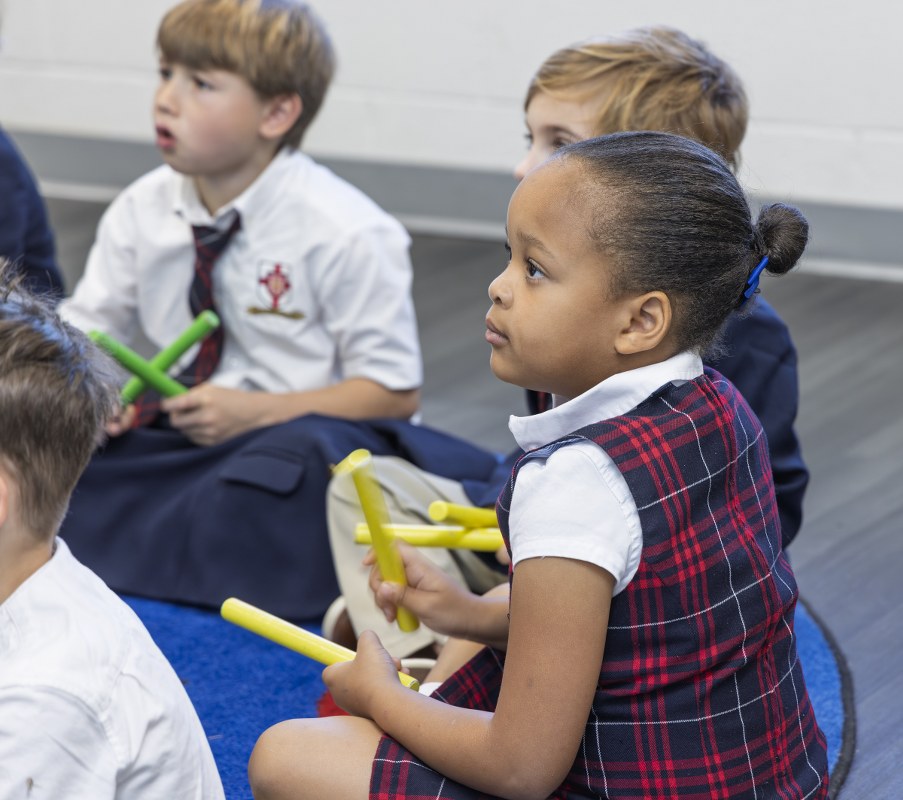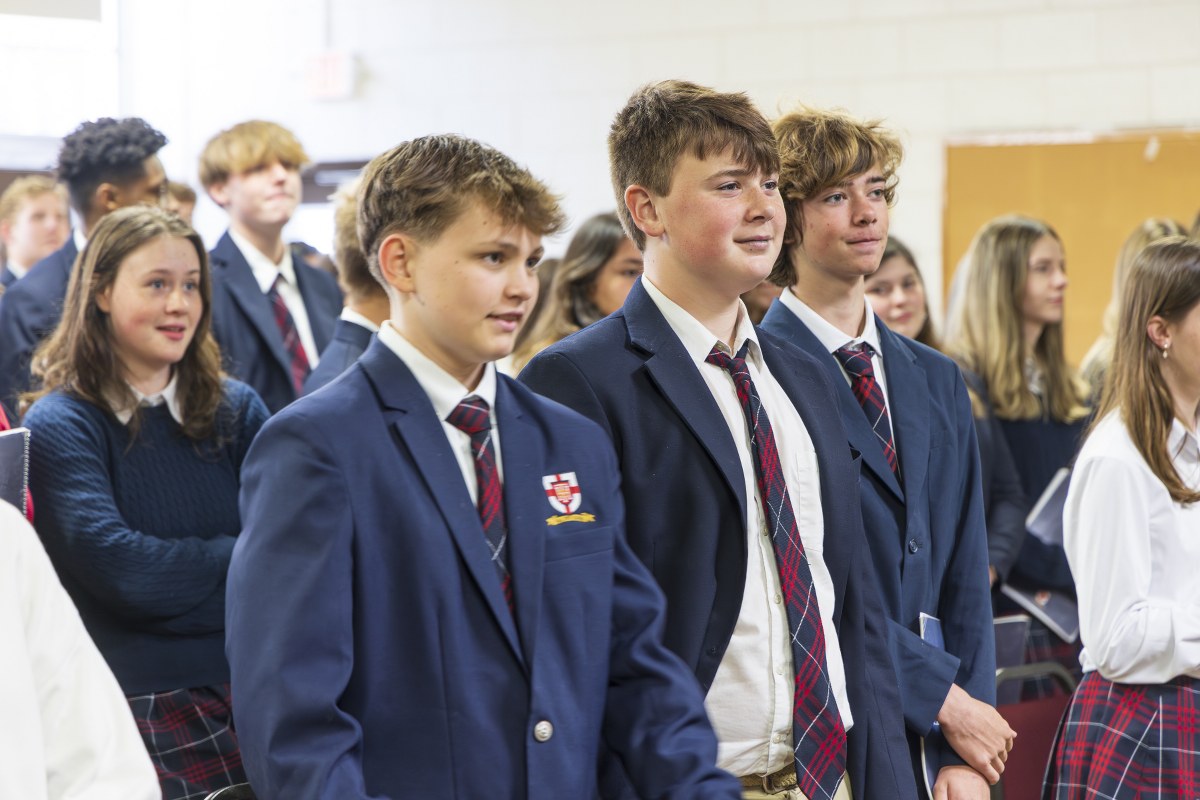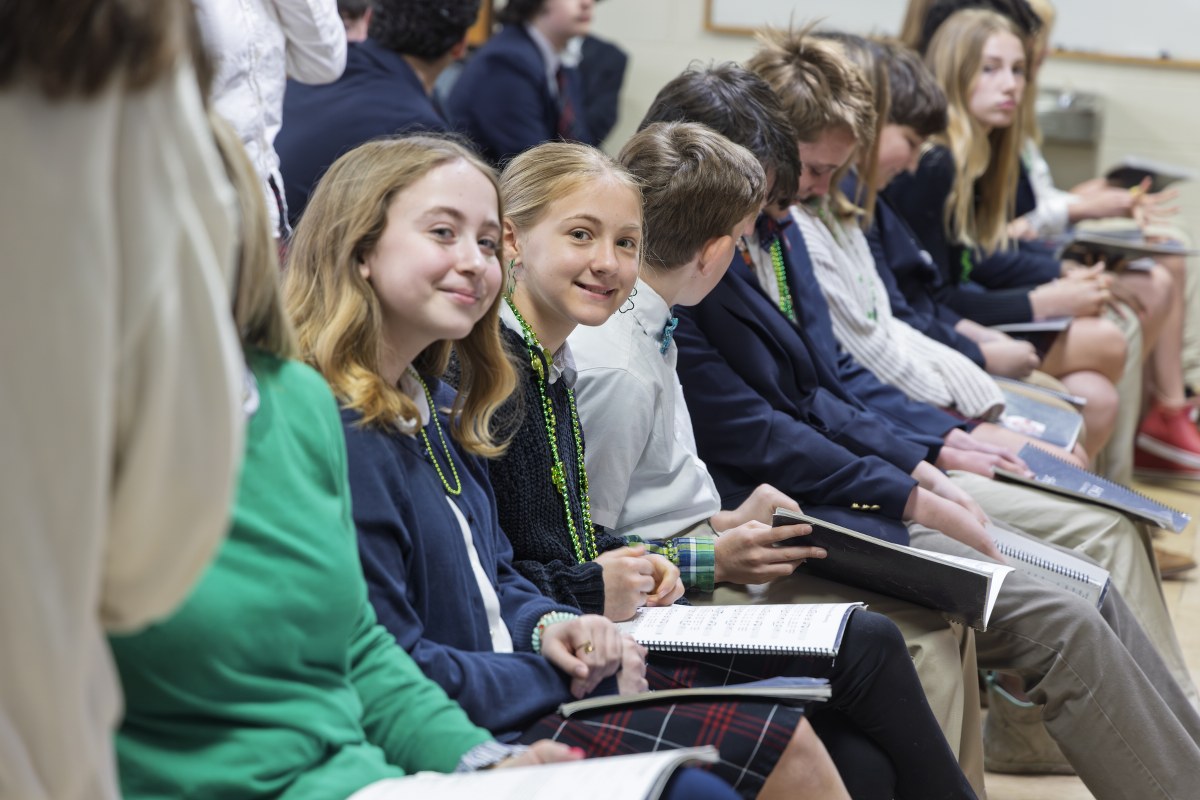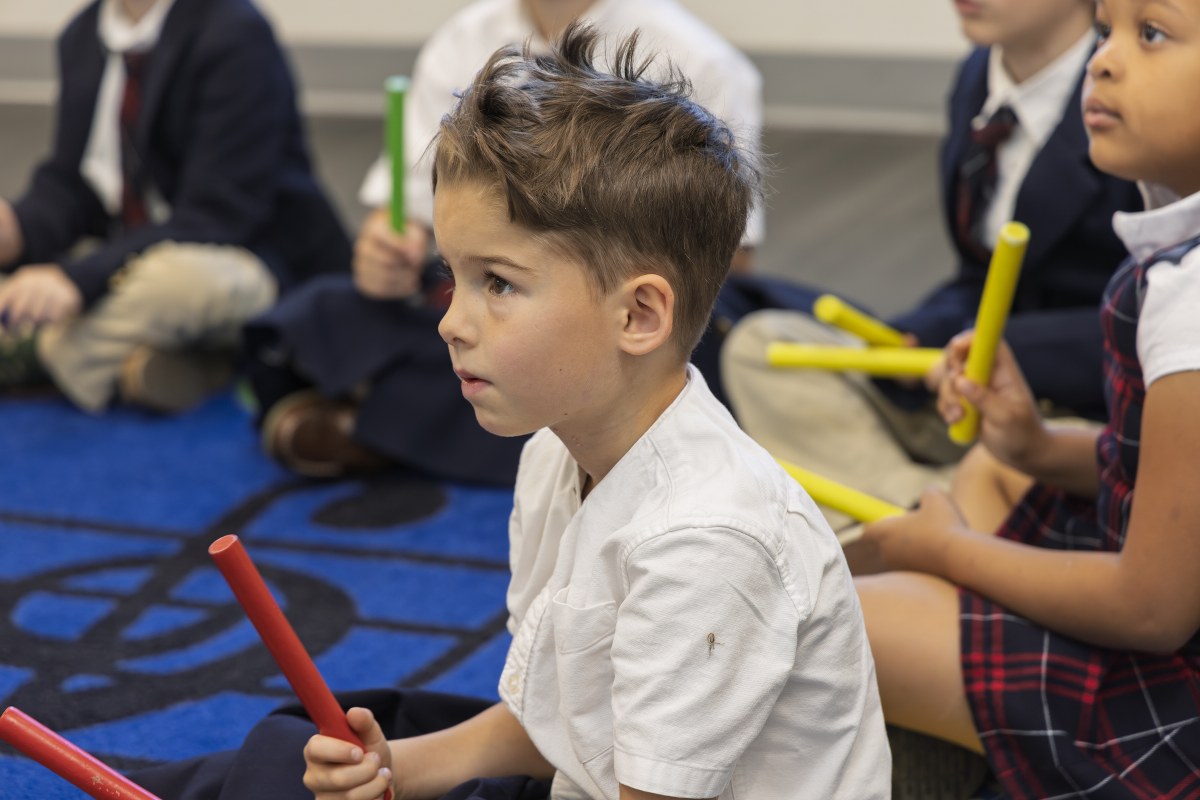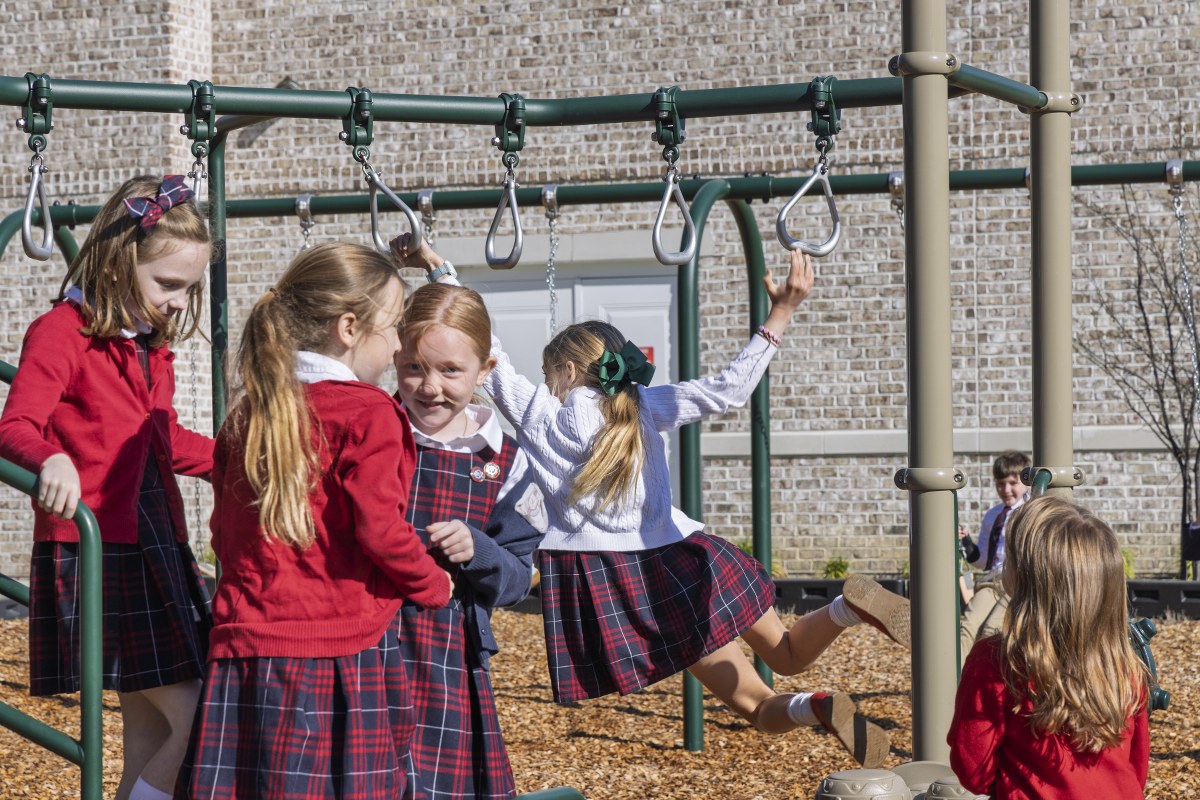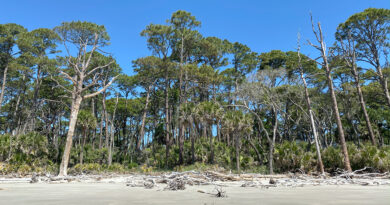Holy Trinity Classical Christian School
Meeting a demand for a different approach to education
story by JEANNE REYNOLDS photos by PAUL NURNBERG
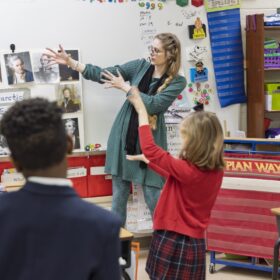
Students, sharpen your pencils for this pop quiz question: What do Dr. Seuss and William Shakespeare have in common?
If your answer is — both have a captivating way with words and have written works enjoyed the world over, you’re not wrong. But that’s not all: Both authors also share a place in the second grade curriculum at Holy Trinity Classical Christian School. And, no, that’s not a typo — seven-year-old students at Holy Trinity are just as likely to hear the words of Hamlet as Green Eggs and Ham in their classroom.
“The Bard is not inaccessible to children,” said Elizabeth Booman, second grade teacher and chair of Holy Trinity’s theater department, in a recent school newsletter. “His archaic words may be unfamiliar, but the musical syntax trapped in each syllable is easily heard and appreciated by children. Many credit Dr. Seuss as the writer who ignited their love of reading. Why not let Shakespeare ignite a child’s love of literature? Is it ever too early to ignite such a love? At Holy Trinity, we think not.”
DEVELOPING MINDS AND HEARTS
The idea that students — even very young children — should have the opportunity to experience a wide and deep range of academic challenges is a key part of Holy Trinity’s commitment to providing a classical Christian education. It’s a traditional approach to education that blends the curriculum and teaching methods of the seven liberal arts — grammar, logic, rhetoric, arithmetic, astronomy, music, and geometry — with the historic Christian faith, an approach the school says “nourishes students on truth, goodness, and beauty to cultivate societal leaders characterized by wisdom, eloquence, and virtue.”
“Our students are curious learners and deep thinkers,” said Minnie Bullock, the school’s director of advancement. “They learn how to think and how to ask questions. They’re unafraid to try new things. They learn how to express themselves persuasively and voice their opinions in a way that’s agreeable. These skills will be a blessing to them regardless of where they end up in the future.”
The emphasis on “truth, goodness, and beauty” is more than an idealistic vision of the world, sure to be shattered quickly once students leave school. Instead, it equips them with a foundation to evaluate what they’ll experience in the future, Minnie explains.
“We nourish and pour into very young children the beauty of art, music and poetry, and the elegance of science and math,” she says. “Our students can recognize dissonance when they encounter it because it’s not part of their native tongue.”
Speaking of native tongues, Shakespeare shares shelf space with Latin textbooks in those second grade classrooms. “We start with Latin because it’s the foundation of the Romance languages and helps them learn logic and reasoning,” Minnie says. Students can take modern languages starting in 10th grade.
Those high school years culminate in a rigorous senior thesis project, when seniors must orally defend a written argument they compose based on “great ideas” — justice, freedom, virtue, sacrifice — in Western classic literature, from Lord of the Flies to Pride and Prejudice to the Bible.
The challenging curriculum debunks the idea that Christian schools lack academic rigor. Those in doubt can do the numbers: The school boasts a 100% college acceptance rate since its first graduating class in 2020, with five National Merit Scholarship Finalists, two National Merit Commended Scholars, and 18 Palmetto Scholars among its 79 alumni.
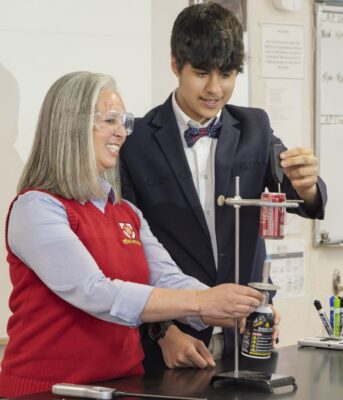 MEETING A GROWING DEMAND
MEETING A GROWING DEMAND
Holy Trinity describes itself as both “distinctly classical and distinctively Christian.” And although it was founded by the Parish Church of St. Helena, it’s not affiliated with a specific religious denomination and includes students from more than a dozen churches in the Beaufort area — as well as some with little to no Christian educational background.
Students enter Holy Trinity’s doors from all across the country, Minnie says. “We’re a military town so there are new families in Beaufort all the time. There’s also been a resurgence of interest in a classical education. We have students whose families have moved here from California and Connecticut and want a classical Christian education for their children.”
The school’s code of conduct follows Christian beliefs — “Students learn to see other people as valuable because we’re all created by God,” Minnie says — and, not surprisingly, is stricter than that found in many public schools. But rather than limit their boundaries, those guidelines actually provide students greater freedom to interact and ask questions, she says, citing a study of playgrounds with and without fences. The researchers found students on playgrounds without fences tended to gather around the teacher and were reluctant to stray far from view. But on fenced-in playgrounds, the children used the entire space, feeling freer to explore.
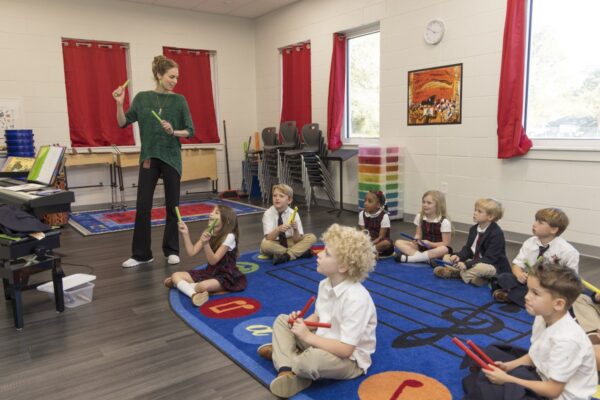 The school is both nondenominational and diverse, Minnie says, pointing to the $18 million in tuition discounts and aid it’s provided in its short history. “This isn’t an elitist school. We want to keep it diverse and accessible. We deliberately chose to build the campus in the city, so students can walk and ride their bikes to school.”
The school is both nondenominational and diverse, Minnie says, pointing to the $18 million in tuition discounts and aid it’s provided in its short history. “This isn’t an elitist school. We want to keep it diverse and accessible. We deliberately chose to build the campus in the city, so students can walk and ride their bikes to school.”
Holy Trinity isn’t all work and no play. In addition to its strong academic program, the school offers a full slate of sports, fine arts, clubs, and activities, from basketball and soccer to theatrical productions and robotics teams.
The bottom line, Minnie says, is you have to see it to understand it. “Come and see us. Sit in a class and watch, listen, and observe. We welcome new families, potential volunteers, and anyone in the community.”
IN THE BEGINNING: THE GENESIS OF HOLY TRINITY CLASSICAL CHRISTIAN SCHOOL
• 2007 — The Rev. Jeff Miller, Parish Church of St. Helena rector, meets with a small group to present the need for a classical Christian school in Beaufort.
• 2009 — An ad hoc committee forms to research classical Christian education and the feasibility of founding a new school in Beaufort.
• June 2011 — A 40-member board of governors adopts bylaws and elects a board of trustees, starts the application for 501(c)(3) status, and affirms the school’s mission and statement of faith. The board of trustees hires the Rev. Chad Lawrence, a curate at the Parish Church of St. Helena, as founding headmaster.
• September 2011 — The Rev. Lawrence begins work as founding headmaster, working with the board of trustees to find a suitable building, hire teachers, choose curricula, and recruit students.
• August 2012 — Holy Trinity opens to approximately 100 students in preschool through fifth grades in a leased building owned by the Beaufort County School District, with plans to add a grade a year.
• August 2016 — The school has grown to approximately 275 students up to ninth grade. The preschool moves to a satellite campus, renting classrooms and offices at the Parish Church of St. Helena.
• 2020 — The first senior class graduates.
• 2022 — The Rev. Lawrence steps down as headmaster and the Rev. Joe Lawrence is named as interim headmaster.
• 2024 — Kevin Bolen is named head of school beginning the 2024-2025 academic school year.
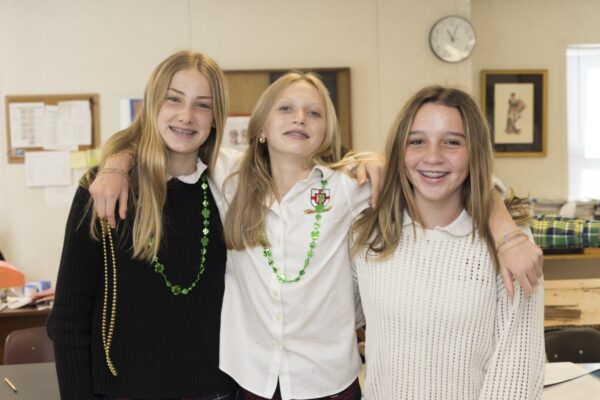
GRAB A FRONT-ROW SEAT FOR HOLY TRINITY’S SPRING PRODUCTION
See Holy Trinity’s theater department in action at the spring production of Hideaway Hollow, a play written by Elizabeth Booman, second grade teacher and theater department chair. The production also will include live music by The Fiddler and the Flutist, Glen Alexander and Sharon Fogarty, an Irish grass/pop duo who combine the latest technology with high-caliber instrumental technique to produce music ranging from acoustic to unique techno entertainment. Learn more on The Fiddler and the Flutist website at thefiddlerandtheflutist.com.
When: Thursday, May 5 and Friday, May 9
Where: Praise Assembly Church, 800 Parris Island Gateway in Beaufort
Tickets: Available on the school’s website at www.HTCCS.org


